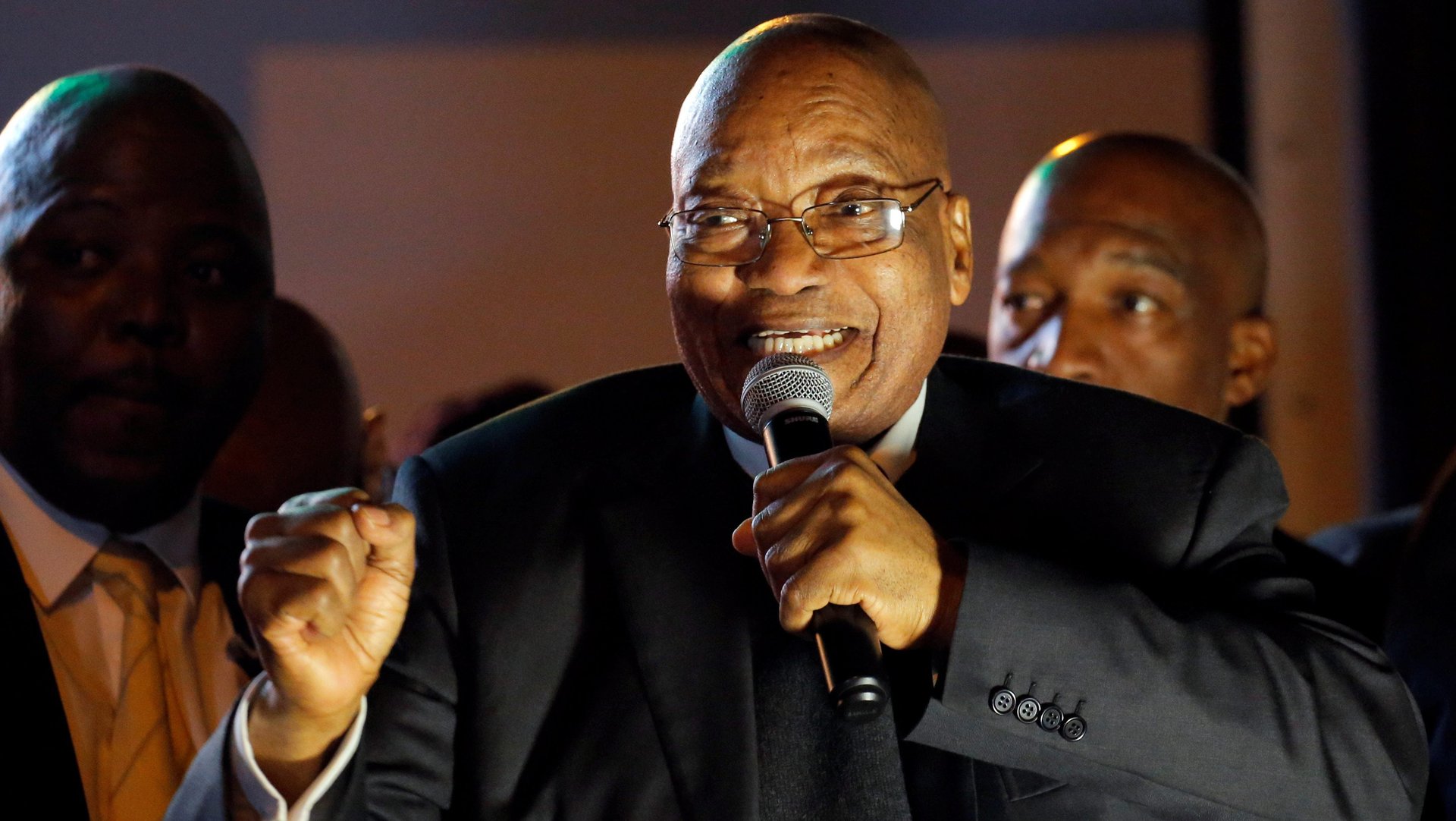South Africa’s president Jacob Zuma has survived yet another vote of no-confidence—but only just
South African president Jacob Zuma has survived his sixth vote of no-confidence with a narrow win of just 198 votes in his favor versus 177 against and 9 abstentions. It was the highest number of votes secured by the opposition in the last four motions against the ANC president, winning 51 more votes than the motion last November.


South African president Jacob Zuma has survived his sixth vote of no-confidence with a narrow win of just 198 votes in his favor versus 177 against and 9 abstentions. It was the highest number of votes secured by the opposition in the last four motions against the ANC president, winning 51 more votes than the motion last November.
Tensions have been high across the country as South Africans awaited the verdict on whether Zuma and his 72 cabinet members would be forced to step down after the Constitutional Court ruled in favor of a secret ballot in late July.
In Johannesburg and Pretoria, highways were blocked after protesters placed rocks and burned tires on the road. Thousands of anti-Zuma demonstrators held a rally outside parliament buildings in Cape Town clad with “Fire Zuma” placards and signs.
The numbers were always going to go in favor of president Jacob Zuma, despite the opposition parties’ attempt to shore their bets as a united front.
Opposition parties were quite taken with the idea this would be the eighth attempt to unseat Zuma, on the eighth day of the eighth month, but fact-checking organization AfricaCheck say they’ve miscounted. There have actually only been five motions in parliament (so this would be the sixth), and a separate move to impeach him (which is different under South African law).
Both opposition and ANC MPs are possibly also counting two internal party votes leveled against Zuma. In the end, however, the only numbers that counted were the 198 votes against the motion of no-confidence, trumping the 177 votes for it.
It is unlikely though, that Zuma will read those numbers as a show of poor faith in his mandate. South Africa’s embattled president has a near perfect track-record of surviving attempts to remove him. Despite the decision to hold a secret ballot and an appeal to ruling party lawmakers’ conscience, the African National Congress’ party line could not be broken.
“I’m just not sure there was enough personal incentive for the MPs to break with the party line,” said Phephelaphi Dube, director for the Centre for Constitutional Rights.
Zuma’s removal would have meant that cabinet would have to be dissolved, meaning politicians would once again have to jockey for position. And those who have spoken out against Zuma, like MP Makhosi Khoza, have been threatened and their families followed and harassed.
Still, the vote was far narrower, including nine abstentions than in previous sessions, showing just how fractured the ruling party is. As the result was read, the ANC’s celebrations were punctuated with shouts of “sell-out” and “traitor” across the benches to the 20 or so ANC members who likely voted against Zuma.
Zuma not only remains the president of South Africa, but also of the ruling African National Congress. He’ll remain in power until December’s elective conference, his term likely coming to a routine end. It’s unclear whether he’ll choose to step down as the country’s president once he leaves the ANC’s leadership, but by then it will be someone else’s problem.
Choosing to ride out with Zuma for a few more months will likely cost Nelson Mandela’s party at the 2019 general election. By then, Zuma would have comfortably retired (either at his palatial compound in Nkandla, KwaZulu-Natal, or far away from the South African justice system in Dubai—depending on who succeeds him). The party, however, would have demonstrated its failure to deal with graft and lawlessness.
“We have too look at the bigger picture here: There is so much impunity in other organs of state,” said Dube. “It certainly casts doubt for a lot of South Africans over the ANC’s ability to deal with corruption.”
The National Prosecuting Authority, the South African Revenue Service and the South African Police Service have all been dragged into political infighting. State-owned enterprises like the national power supplier Eskom, the national rail company Transnet, and South African Airways have allegedly been looted for the benefit of Zuma’s cronies. Even international corporations failed to protect their reputations in South Africa’s sullied political environment.
The axing of former finance minister Pravin Gordhan and a subsequent credit rating downgrade triggered the current political and economic crisis. While MPs have wrangled over the vote, at least 15,000 South Africans lost their jobs last quarter, adding to the record—and stubbornly consistent—unemployment rate.
While MPs voted to keep Zuma in his seat, outside opposition parties led protests to parliament in Cape Town, and the Union Buildings in Pretoria. It’s the kind of public outrage that could translate to votes in the 2019 election.